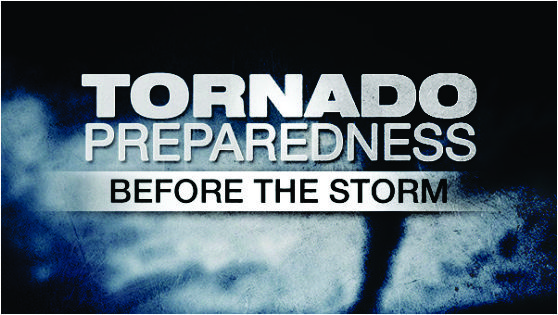
The following article is borrowed and attributed from the website: www.disabled-world.com, and was written by Thomas C. Weiss, most recently updated on 4/29/2014. The information is intended for individuals and family members who have several different forms of disabilities (i.e., intellectual disabilities, blindness, hearing loss, mobility, etc.). We provide this information in its entirety, as educational and you may share with others depending on their personal needs.
Ric Miller | Director of Development & Communications | Crossroads of Western Iowa
Tornadoes are the most unpredictable, violent, and sudden storms on planet earth. The state of Florida receives the most tornados of any state in America, while a strip of land that reaches from northeast Texas through Oklahoma, Kansas, Nebraska, and Missouri has more tornadoes than any other place in the United States. The area is referred to as, 'Tornado Alley.'
A safe room may provide people with life-saving protection from the forces of tornadoes and severe winds. You might not have enough time to seek shelter outside of the home you live in during a tornado.
People with disabilities or medical conditions might have to take additional steps to protect themselves during an emergency such as a tornado.
If you have family members, friends, or neighbors with disabilities help them with the following additional precautions. People with disabilities may require assistance and more lead time to prepare for such a disaster. The list below provides you with some practical tips for people with disabilities during an emergency.
- If you call 911, tap the space bar to engage the TDD system.
- Keep a whistle, bell, or flashlight at hand to signal your location to other people.
- Consider installing an alarm with a strobe light outside of your home to alert neighbors.
- If you live in an apartment building ask the management to clearly mark accessible exits.
- Register with your local fire department, emergency management, and volunteer centers.
- Install fire safety devices in your home such as smoke alarms, fire extinguishers and a flashlight.
- If you experience a mobility impairment and work or live in a high-rise building have an escape chair.
- Have an alternative means of communication such as a writing tablet, a dry erase board, or markers.
- Identify a number of evacuation routes at your home and at work, and ask your employer to include and test the plans.
- Test your alarms and extinguishers on a regular basis and replace the batteries in your smoke alarms every six months.
- Stock additional emergency supplies such as blankets, batteries, medications, cash, water, non-perishable foods, and a weather radio.
- Post emergency instructions on your refrigerator, including a list of the equipment you need, medication dosages, and emergency contact numbers.
- Create a personal support network of family members, friends, and neighbors who can help in disaster preparations and getting you to a place that is safe.
- Carry emergency health information and contacts with you all the time. A medical alert bracelet or tag to identify the disabilities you experience can be helpful.
- If you use a battery-operated wheelchair, life-support system, or other equipment that is power-dependent – call your power company before a power outage threatens.
- Keep extra oxygen, wheelchair batteries, medications, catheters, food for hearing or guide dogs and additions items you might need, as well as a list of the type and serial numbers of the medical devices you use.
A number of utility companies maintain a map and list of the locations of customers who are power-dependent in case of an emergency. Ask your utility companies what alternatives are available in your area. Contact the customer service department of your utility companies to find out if this service is available where you live.
If you use a power wheelchair or a scooter keep an extra battery. A car battery might also be used with a wheelchair, but it will not last as long as a wheelchair's deep-cycle battery. Store a lightweight manual wheelchair for backup.
If you are blind or experience a visual disability, store a Braille or talking clock, or a large-print timepiece with additional batteries. If you are deaf or experience a hearing loss, consider getting a small portable battery-operated television set. Emergency broadcasts might provide information in American Sign Language (ASL) or through captions.
People with visual impairments might be extremely reluctant to leave surroundings that are familiar to them when the request for evacuation comes from a person they do not know. A guide dog may become disoriented or confused during a disaster. People with visual impairments may have to depend on other people to lead them or their guide dog to safety during a disaster.
People who experience a hearing impairment might need to make arrangements to receive warnings. Those who experience mobility impairments may need assistance to get to shelter. People who do not have a vehicle may need to make arrangements for transportation.
Those who have special dietary needs should take additional precautions and have an adequate emergency food supply. Anyone with a medical condition needs to know the location and availability of more than one facility if they are dependent on a dialysis machine for example, or other life-sustaining treatment or equipment. People with intellectual disabilities might need assistance with responding to emergencies and getting to shelter. Remember that during a disaster such as a tornado, helping your neighbor means everything.









